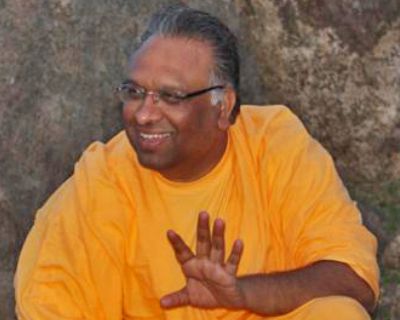Height of insensitivity?
Well, the Kurukṣetra war, where the actual discourse of the Gītā happened, offers a similar if not graver setting. If you find Kṛṣṇā utterly insensitive, as someone insistent enough to push his beliefs and truths on us—the doctors and clinicians—and that too in a crisis that humankind is struggling to cope with, Arjuna should have found himself feeling the same! If he had indeed felt that way, the world would never have the Bhagavadgītā. But, thankfully for mankind, and unlike most of us doctors and clinicians, Arjuna chose to listen, to consider an utterly radical view of life, right there on the battlefield, right in the hospital of life!
Do you realise the demands upon open-mindedness? Exactly when your brain and body is cluttered by the gravest of emergency, and when all of humanity has accorded fighting the virus as the topmost priority, to choose that very moment to listen to a radically alternate view to life, is not just blasphemous, but would be considered gross neglect of duty, criminal. Yes?
Well, Kṛṣṇā and Vyāsā won’t mind being considered criminal, both in intent as well as for insensitivity.
A genius filmmaker would marvel at this sense of drama that Vyāsā brings to open out the Bhagavadgītā, almost making it necessary for us to think that sans such disruptive drama—a life and death setting—the Bhagavadgītā wouldn’t have made its mark. The setting is as vital as the message, and what a complex and intricate message it is!
So, it makes it almost necessary for you to be in that precarious and anxious situation, where your gut is being ransacked by doubt/fear/uncertainty, cornered and held there, finding no release, where it seeks immediate solace, yet knows that such solace isn’t the right answer, and in such a doldrum, discovers an open-mindedness to consider a different view of life.
We have made life precious, without ever pondering over why we did it. Having done that, naturally, disease, death, loss of limb or organ, would be enemies, isn’t it? Look at how many scientists and labs are invested in knowledge. Knowledge to defeat the Coronavirus. There is desperation and urgency to find something to stop this pandemic, isn’t it? Some discovery, some invention, some knowledge? Isn’t that what you would yourself do if you or your near and dear are in some precarious condition? All knowledge is deployed to be used to ward off the threats you face, isn’t it? So that you can continue to uphold within that life is precious, and it is to be protected at whatever cost!
By the same coin, if you acquiesce, if you let go, if you allow death and disease to take over, the feeling inside is of being defeated, of having succumbed, of not having tried enough, isn’t it? Isn’t this too coming from the same centre, that life is precious?
Kṛṣṇā begins his discourse, questioning that very preciousness attached to life. He asks Arjuna why he places such high value to life, whether his or that of his relatives on the opposite side. To find an answer to that question, you must stop doing both—protecting life because it is precious or giving up in defeat.
Why have you made life precious? The question is not whether life is valuable in itself or not. Why have you made life valuable? Why is it precious to you?
Some default mode? Not really. You are clinging to life because that is the only platform for everything. To do, to achieve and feel worthy, to experience happiness of all kinds, so on and so forth. Until situations corner you, or when things are taken away from you by destiny, when you are likely to be even contemplating suicide in defeat and humiliation, you don’t realise how precious life is to you, and how much you want to shape it, or to eke the maximum out of it, or to take it to its true height of dignity. Arjuna is in that very kind of situation. But, he doesn’t realise the gravity of the opportunity that Kṛṣṇā senses.
Wake up to the soul, Kṛṣṇā urges, right at the start. Realise that life as is known now isn’t the end. Death doesn’t destroy everything. It merely reveals something so vital about you, that seems masked right now. That seems unavailable to you now because you are too extroverted. You are too held by the very identity you are struggling to shape. You are too immersed in fighting social forces and finding a way for yourself. You are too desperate to defeat your internal ghosts and rise above the clutter, to assert yourself to your full potential. You are too caught in all of these that you don’t realise something very profound about yourself.
‘Oh! I know what you are going to say. You are talking about some soul that survives death, that transmigrates from this life to the next, and so on. Just utter nonsense! Not that I don’t believe it. But, that belief doesn’t give me the solace or the strength to live today’s life. I am unable to face the situation at hand without collapsing; that belief doesn’t help. And, it appears weak, even escapism. It is as though I don’t have an answer to the situation at hand, but I am simply declaring that it can’t damage me fundamentally and that I can survive. Even if I die, I shall still survive and take another birth. What is the point of such eternal survival?’
Let us examine this further, along with Arjuna. What is he lamenting about? All his life he showed his prowess and ability to score brownie points over Karṇa, to win admiring glances from Kunti and Yudhiṣṭhira, to put fear and jealousy in Duryodhana, to please Droṇa and Bhīṣma, to make a statement to all the other kings and princes assembled there on the battlefield. In other words, Arjuna, unconsciously, seemed to have created a human ecosystem, in which he lived. The presence of Yudhiṣṭhira was as important as that of Karṇa or Duryodhana. If Karṇa and Duryodhana or someone of their calibre didn’t exist, then the enormous assuring strength Arjuna could provide the Pāṇḍavās wouldn’t be necessary and would therefore not exist, and therefore, the dependence of Kunti and Yudhiṣṭhira upon him wouldn’t exist. Do you get the picture? The villains, the jokers, the heroes, the Gods, the supporters and admirers, the audience, the stake of a kingdom that was involved—all these were just as important in this elaborate self-worth game. Now, this war could destroy the entire game itself. Even if Karṇa and Duryodhana died, instead of Bhīṣma, Arjuna’s world would have been just as shattered.
You understand mamatā or mamakāra now? You are playing a game. Something appears worthy because the person for whom you fight, values you a lot. Values your abilities a lot. And, your abilities are the key, and therefore you become worthy, because there are dangerous enemies who can snatch the entire plot away.
You play family-family because the family needs you, is dependent on you, values you for what you do and bring, and therefore, it provides a purpose to your life. Remove the family, and all the money you bring appears to have no point, the house you built seems to have no point; you get the picture now? You have a deviant and errant child, and therefore, you learn to be patient, and yet work for small but significant changes in that child. You consciously sculpt the stone that covers the sculpture, and eventually, let us say, the child does grow into a teenager, quite changed and reformed. If that child were to be taken away from you when young, much before the sculpting had ended, then you would feel lost, wouldn’t you? Like the very purpose of existence snatched away!
Arjuna was playing in an arena, and he realised it only on the first day of the war. Without any one of those foes or friends, or the vast audience of soldiers and leaders of men watching him, what he lived for seemed unworthy. And, with the thought that the war was going to take away most of that ecosystem itself, that arena itself, he felt lost, disillusioned. ‘This is not what I ordered for!’, his heart cried.
Living amongst human beings, working for them, fighting their battles, navigating through issues that social systems and mindsets create, finding happiness and worthiness in it, showing your prowess in solving things that other humans can’t solve, seeking rewards, approval, admiration, and authentication from these very mindsets and systems and humans, being cherished and valued by these very humans, both individually as well as collectively—isn’t this the tragic story of mamakāra? And now, as you age, in the evening of your life, that entire ecosystem that you lived for, fought for, fought against, strived to erect—that entire thing creaks and finally collapses before your very eyes, doesn’t it? And, you are suddenly left nowhere, with no one to fight for, nothing to live for; you get the humiliation and the ill-dignity that life serves you at the end? Isn’t sorrow natural?
Destiny is not going to merely take away Yudhiṣṭhira, his elder brother, who had become his purpose and guiding light, and working for whom felt right. It may take away Kṛṣṇā, Bhīṣma, even the famous villains Duryodhana, Śakuni, and Karṇa. Or, the vast audience in the form of soldiers and army leaders, who would always bow down in deference each time Arjuna walked, and who worshipped him as their hero. That entire human bowl, that whole arena, is likely to vanish with this war. That is the sorrow of Arjuna! He even offers to keep that arena intact, and renounce! That is how much that entire arena is essential and precious to Arjuna.
As a warrior, Arjuna isn’t worried about his death. Was never. So, the issue was never about his survival and the fear of what happens to him post-death. He is too much in the action of the world, to bother about after-life issues. He feels it more important to make a statement to the people here with a valorous death, rather than worry about after-life issues. But, do you understand the grab of mamakāra now? How it holds you, me, or Arjuna? And, how it stops you from seeing whatever Kṛṣṇā points out in the rest of the Gītā? Why is it that Arjuna, being so intelligent and capable, not see the truths that Kṛṣṇā was espousing, all his life? Because, he was engrossed in the human world, playing his games of self-worth: pride here, humiliation there, proving a point there, philosophising here, enjoying there, and fearing here. All through that, erecting an identity that is valued, cherished, gloated over, admired by all, and so on. That identity itself erected in that very ecosystem, isn’t it? So, that identity and the human ecosystem in which it is erected, both are parasitically inter-dependent, isn’t it? When that ecosystem is destroyed, in other words, you are destroying the value of the identity erected itself, isn’t it?
Therefore, Kṛṣṇā begins with mocking Arjuna. Mocking the affection and attachment he has with his brothers, mother, and Draupadi. Mocking the concern he has about his cousins Duryodhana, Duḥśāsana, or even Karṇa. Or his feelings of reverence for Bhīṣma, Droṇa, and Kṛpa. Or, his general worry about what will happen to the community post the war, and the kind of deterioration of Dharma that shall take place. Or, the fate of women, because all the men are likely to perish in this war. Kṛṣṇā mocks every sentiment, every feeling, every concern, every part of his grief, pooh-poohs it as an attempt by Arjuna to escape the essential truth of his loss of self-worth. In short, every feeling, every experience, every noble deed, every act of worship and deference shown, every learning learnt—Kṛṣṇā is dismissing all as a grand show of self-worth! Mamakāra!
Sir, the call of the soul is always there. You and I, as well as Arjuna, have been merely ignoring it. Good forces of this world knock at our doors continuously. Destiny keeps warning us, with many subtle messages. Many things keep nudging us from the back. Our inner conscience is very often beset with fundamental doubts and fears. Yet, you and I, in our endless apathy, ignore these, unconsciously hush them up, make every effort not to be disrupted within fundamentally, want to keep our cool, want to feel good, positive, and strong about ourselves and the world and what we do there, and continue growing what we always grew, for the same people, either as a duty, or as a show-off, or for gain, or whatever else. If you don’t wake up as the soul, not as some weak transmigrating entity, but to the truth of this Universe, you are merely asking destiny to corner you as it did with Arjuna. Luckily, for Arjuna, there was Kṛṣṇā. And, the one who is known to the world as the epitome of sweetness gives such a hard slap to Arjuna! Kṛṣṇā may not always be there. Destiny may leave you to yourself, abandoned and lost within, with no sense to seek light on your own.
Wake up from your self-worth and identity building mire, sir. Wake up from your extroverted proactivity. Wake up from leading a life of mamakāra. Wake up to the truths of this life and Universe.
Pop (popular) spirituality of today may make you think this way: That within all of us lies a greater potential, call it God, call it divine, call it spiritual. And that, one must unearth it, to become selfless, stronger, more giving, etc. Well, the Gītā is dismissing any such poor perception. If at all, in terms of unearthing potential, there cannot be anyone greater than Arjuna. Translated to the present times, Arjuna is at least ten times fitter and skilful than a Virat Kohli, at least a ten times greater in political and war strategy than a Narendra Modi, at least a ten times more charming than any Bollywood hero, at least a ten times more loyal to his family and brothers than any loyalty you can find today, all rolled into one. So, a fully bloomed personality, whose potential has come out fully, is being dismissed by Kṛṣṇā here as a lower being, held in mamakāra.
You can’t grow from a limited being into a higher being gradually. You must shed the limited being entirely and only then rise as the higher being, the soul.
Wake up as the soul. That is the first and primary message of the Gītā.








